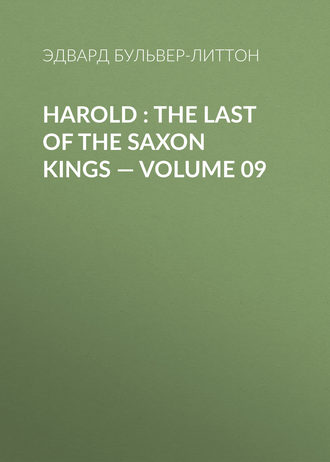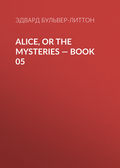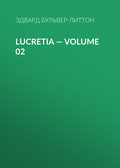
Эдвард Бульвер-Литтон
Harold : the Last of the Saxon Kings — Volume 09
CHAPTER IV
The snares now spread for Harold were in pursuance of the policy thus resolved on. The camp soon afterwards broke up, and the troops took their way to Bayeux. William, without greatly altering his manner towards the Earl, evaded markedly (or as markedly replied not to) Harold's plain declarations, that his presence was required in England, and that he could no longer defer his departure; while, under pretence of being busied with affairs, he absented himself much from the Earl's company, or refrained from seeing him alone, and suffered Mallet de Graville, and Odo the bishop, to supply his place with Harold. The Earl's suspicions now became thoroughly aroused, and these were fed both by the hints, kindly meant, of De Graville, and the less covert discourse of the prelate: while Mallet let drop, as in gossiping illustration of William's fierce and vindictive nature, many anecdotes of that cruelty which really stained the Norman's character, Odo, more bluntly, appeared to take it for granted that Harold's sojourn in the land would be long.
"You will have time," said he, one day, as they rode together, "to assist me, I trust, in learning the language of our forefathers. Danish is still spoken much at Bayeux, the sole place in Neustria12 where the old tongue and customs still linger; and it would serve my pastoral ministry to receive your lessons; in a year or so I might hope so to profit by them as to discourse freely with the less Frankish part of my flock."
"Surely, Lord Bishop, you jest," said Harold, seriously; "you know well that within a week, at farthest, I must sail back for England with my young kinsmen."
The prelate laughed.
"I advise you, dear count and son, to be cautious how you speak so plainly to William. I perceive that you have already ruffled him by such indiscreet remarks; and you must have seen eno' of the Duke to know that, when his ire is up, his answers are short but his arms are long."
"You most grievously wrong Duke William," cried Harold, indignantly, "to suppose, merely in that playful humor, for which ye Normans are famous, that he could lay force on his confiding guest?"
"No, not a confiding guest,—a ransomed captive. Surely my brother will deem that he has purchased of Count Guy his rights over his illustrious prisoner. But courage! The Norman Court is not the Ponthevin dungeon; and your chains, at least, are roses."
The reply of wrath and defiance that rose to Harold's lip, was checked by a sign from De Graville, who raised his finger to his lip with a face expressive of caution and alarm; and, some little time after, as they halted to water their horses, De Graville came up to him and said in a low voice, and in Saxon:
"Beware how you speak too frankly to Odo. What is said to him is said to William; and the Duke, at times, so acts on the spur of the moment that—But let me not wrong him, or needlessly alarm you."
"Sire de Graville," said Harold, "this is not the first time that the Prelate of Bayeux hath hinted at compulsion, nor that you (no doubt kindly) have warned me of purpose hostile or fraudful. As plain man to plain man, I ask you, on your knightly honour, to tell me if you know aught to make you believe that William the Duke will, under any pretext, detain me here a captive?"
Now, though Mallet de Graville had lent himself to the service of an ignoble craft, he justified it by a better reason than complaisance to his lords; for, knowing William well, his hasty ire, and his relentless ambition, he was really alarmed for Harold's safety. And, as the reader may have noted, in suggesting that policy of intimidation, the knight had designed to give the Earl at least the benefit of forewarning. So, thus adjured, De Graville replied sincerely:
"Earl Harold, on my honour as your brother in knighthood I answer your plain question. I have cause to believe and to know that William will not suffer you to depart, unless fully satisfied on certain points, which he himself will, doubtless, ere long make clear to you."
"And if I insist on my departure, not so satisfying him?"
"Every castle on our road hath a dungeon as deep as Count Guy's; but where another William to deliver you from William?"
"Over yon seas, a prince mightier than William, and men as resolute, at least, as your Normans."
"Cher et puissant, my Lord Earl," answered De Graville, "these are brave words, but of no weight in the ear of a schemer so deep as the Duke. Think you really, that King Edward—pardon my bluntness—would rouse himself from his apathy, to do more in your behalf than he has done in your kinsmen's—remonstrate and preach?—Are you even sure that on the representation of a man he hath so loved as William, he will not be content to rid his throne of so formidable a subject? You speak of the English people; doubtless you are popular and beloved, but it is the habit of no people, least of all your own, to stir actively and in concert, without leaders. The Duke knows the factions of England as well as you do. Remember how closely he is connected with Tostig, your ambitious brother. Have you no fear that Tostig himself, earl of the most warlike part of the kingdom, will not only do his best to check the popular feeling in your favour, but foment every intrigue to detain you here, and leave himself the first noble in the land? As for other leaders, save Gurth (who is but your own vice earl), who is there that will not rejoice at the absence of Harold? You have made foes of the only family that approaches the power of your own—the heirs of Leofric and Algar.—Your strong hand removed from the reins of the empire, tumults and dissensions ere long will break forth that will distract men's minds from an absent captive, and centre them on the safety of their own hearths, or the advancement of their own interests. You see that I know something of the state of your native land; but deem not my own observation, though not idle, sufficed to bestow that knowledge. I learn it more from William's discourses; William, who from Flanders, from Boulogne, from England itself, by a thousand channels, hears all that passes between the cliffs of Dover and the marches of Scotland."
Harold paused long before he replied, for his mind was now thoroughly awakened to his danger; and, while recognising the wisdom and intimate acquaintance of affairs with which De Graville spoke, he was also rapidly revolving the best course for himself to pursue in such extremes. At length he said:
"I pass by your remarks on the state of England, with but one comment. You underrate Gurth, my brother, when you speak of him but as the vice earl of Harold. You underrate one, who needs but an object, to excel, in arms and in council, my father Godwin himself.—That object a brother's wrongs would create from a brother's love, and three hundred ships would sail up the Seine to demand your captive, manned by warriors as hardy as those who wrested Neustria from King Charles."
"Granted," said De Graville. "But William, who could cut off the hands and feet of his own subjects for an idle jest on his birth, could as easily put out the eyes of a captive foe. And of what worth are the ablest brain, and the stoutest arm, when the man is dependent on another for very sight!"
Harold involuntarily shuddered, but recovering himself on the instant, he replied, with a smile:
"Thou makest thy Duke a butcher more fell than his ancestor Rolfganger. But thou saidst he needed but to be satisfied on certain points. What are they?"
"Ah, that thou must divine, or he unfold. But see, William himself approaches you."
And here the Duke, who had been till then in the rear, spurred up with courteous excuses to Harold for his long defection from his side; and, as they resumed their way, talked with all his former frankness and gaiety.
"By the way, dear brother in arms," said he, "I have provided thee this evening with comrades more welcome, I fear, than myself—Haco and Wolnoth. That last is a youth whom I love dearly: the first is unsocial eno', and methinks would make a better hermit than soldier. But, by St. Valery, I forgot to tell thee that an envoy from Flanders to-day, amongst other news, brought me some, that may interest thee. There is a strong commotion in thy brother Tostig's Northumbrian earldom, and the rumour runs that his fierce vassals will drive him forth and select some other lord: talk was of the sons of Algar—so I think ye called the stout dead Earl. This looks grave, for my dear cousin Edward's health is failing fast. May the saints spare him long from their rest!"
"These are indeed ill tidings," said the Earl; "and I trust that they suffice to plead at once my excuse for urging any immediate departure. Grateful I am for thy most gracious hostship, and thy just and generous intercession with thy liegeman" (Harold dwelt emphatically on the last word), "for my release from a capture disgraceful to all Christendom. The ransom so nobly paid for me I will not insult thee, dear my lord, by affecting to repay; but such gifts as our cheapmen hold most rare, perchance thy lady and thy fair children will deign to receive at my hands. Of these hereafter. Now may I ask but a vessel from thy nearest port."
"We will talk of this, dear guest and brother knight, on some later occasion. Lo, yon castle—ye have no such in England. See its vawmures and fosses!"
"A noble pile," answered Harold. "But pardon me that I press for—"
"Ye have no such strongholds, I say, in England?" interrupted the Duke petulantly.
"Nay," replied the Englishman, "we have two strongholds far larger than that—Salisbury Plain and Newmarket Heath!13—strongholds that will contain fifty thousand men who need no walls but their shields. Count William, England's ramparts are her men, and her strongest castles are her widest plains."
"Ah!" said the Duke, biting his lip, "ah, so be it—but to return:—in that castle, mark it well, the Dukes of Normandy hold their prisoners of state;" and then he added with a laugh; "but we hold you, noble captive, in a prison more strong—our love and our heart."
As he spoke, he turned his eye full upon Harold, and the gaze of the two encountered: that of the Duke was brilliant, but stern and sinister; that of Harold, steadfast and reproachful. As if by a spell, the eye of each rested long on that of the other—as the eyes of two lords of the forest, ere the rush and the spring.
William was the first to withdraw his gaze, and as he did so, his lip quivered and his brow knit. Then waving his hand for some of the lords behind to join him and the Earl, he spurred his steed, and all further private conversation was suspended. The train pulled not bridle before they reached a monastery, at which they rested for the night.
CHAPTER V
On entering the chamber set apart for him in the convent, Harold found Haco and Wolnoth already awaiting him; and a wound he had received in the last skirmish against the Bretons, having broken out afresh on the road, allowed him an excuse to spend the rest of the evening alone with his kinsmen.
On conversing with them—now at length, and unrestrainedly—Harold saw everything to increase his alarm; for even Wolnoth, when closely pressed, could not but give evidence of the unscrupulous astuteness with which, despite all the boasted honour of chivalry, the Duke's character was stained. For, indeed in his excuse, it must be said, that from the age of eight, exposed to the snares of his own kinsmen, and more often saved by craft than by strength, William had been taught betimes to justify dissimulation, and confound wisdom with guile. Harold now bitterly recalled the parting words of Edward, and recognised their justice, though as yet he did not see all that they portended. Fevered and disquieted yet more by the news from England, and conscious that not only the power of his House and the foundations of his aspiring hopes, but the very weal and safety of the land, were daily imperilled by his continued absence, a vague and unspeakable terror for the first time in his life preyed on his bold heart—a terror like that of superstition, for, like superstition, it was of the Unknown; there was everything to shun, yet no substance to grapple with. He who could have smiled at the brief pangs of death, shrunk from the thought of the perpetual prison; he, whose spirit rose elastic to every storm of life, and exulted in the air of action, stood appalled at the fear of blindness;—blindness in the midst of a career so grand;—blindness in the midst of his pathway to a throne;— blindness, that curse which palsies the strong and enslaves the free, and leaves the whole man defenceless;—defenceless in an Age of Iron.
What, too, were those mysterious points on which he was to satisfy the Duke? He sounded his young kinsmen; but Wolnoth evidently knew nothing; Haco's eye showed intelligence, but by his looks and gestures he seemed to signify that what he knew he would only disclose to Harold.
Fatigued, not more with his emotions than with that exertion to conceal them so peculiar to the English character (proud virtue of manhood so little appreciated, and so rarely understood!) he at length kissed Wolnoth, and dismissed him, yawning, to his rest. Haco, lingering, closed the door, and looked long and mournfully at the Earl.
"Noble kinsman," said the young son of Sweyn, "I foresaw from the first, that as our fate will be thine;—only round thee will be wall and fosse; unless, indeed, thou wilt lay aside thine own nature—it will give thee no armour here—and assume that which——"
"Ho!" interrupted the Earl, shaking with repressed passion, "I see already all the foul fraud and treason to guest and noble that surround me! But if the Duke dare such shame he shall do so in the eyes of day. I will hail the first boat I see on his river, or his sea-coast; and woe to those who lay hand on this arm to detain me!"
Haco lifted his ominous eyes to Harold's; and there was something in their cold and unimpassioned expression which seemed to repel all enthusiasm, and to deaden all courage.
"Harold," said he, "if but for one such moment thou obeyest the impulses of thy manly pride, or thy just resentment, thou art lost for ever; one show of violence, one word of affront, and thou givest the Duke the excuse he thirsts for. Escape! It is impossible. For the last five years, I have pondered night and day the means of flight; for I deem that my hostageship, by right, is long since over; and no means have I seen or found. Spies dog my every step, as spies, no doubt, dog thine."
"Ha! it is true," said Harold; "never once have I wandered three paces from the camp or the troop, but, under some pretext, I have been followed by knight or courtier. God and our Lady help me, if but for England's sake! But what counsellest thou? Boy, teach me; thou hast been reared in this air of wile—to me it is strange, and I am as a wild beast encompassed by a circle of fire."
"Then," answered Haco, "meet craft by craft, smile by smile. Feel that thou art under compulsion, and act,—as the Church itself pardons men for acting, so compelled."
Harold started, and the blush spread red over his cheeks.
Haco continued.
"Once in prison, and thou art lost evermore to the sight of men. William would not then dare to release thee—unless, indeed, he first rendered thee powerless to avenge. Though I will not malign him, and say that he himself is capable of secret murder, yet he has ever those about him who are. He drops in his wrath some hasty word; it is seized by ready and ruthless tools. The great Count of Bretagne was in his way; William feared him as he fears thee; and in his own court, and amongst his own men, the great Count of Bretagne died by poison. For thy doom, open or secret, William, however, could find ample excuse."
"How, boy? What charge can the Norman bring against a free Englishman?"
"His kinsman Alfred," answered Haco, "was blinded, tortured, and murdered. And in the court of Rouen, they say these deeds were done by Godwin, thy father. The Normans who escorted Alfred were decimated in cold blood; again, they say Godwin thy father slaughtered them."
"It is hell's own lie!" cried Harold, "and so have I proved already to the Duke."
"Proved? No! The lamb does not prove the cause which is prejudged by the wolf. Often and often have I heard the Normans speak of those deeds, and cry that vengeance yet shall await them. It is but to renew the old accusation, to say Godwin's sudden death was God's proof of his crime, and even Edward himself would forgive the Duke for thy bloody death. But grant the best; grant that the more lenient doom were but the prison; grant that Edward and the English invaded Normandy to enforce thy freedom; knowest thou what William hath ere now done with hostages? He hath put them in the van of his army, and seared out their eyes in the sight of both hosts. Deemest thou he would be more gentle to us and to thee? Such are thy dangers. Be bold and frank,—and thou canst not escape them; be wary and wise, promise and feign,—and they are baffled: cover thy lion heart with the fox's hide until thou art free from the toils."
"Leave me, leave me," said Harold, hastily. "Yet, hold. Thou didst seem to understand me when I hinted of—in a word, what is the object William would gain from me?"
Haco looked around; again went to the door—again opened and closed it—approached, and whispered, "The crown of England!"
The Earl bounded as if shot to the heart; then, again he cried: "Leave me. I must be alone—alone now. Go! go!"







